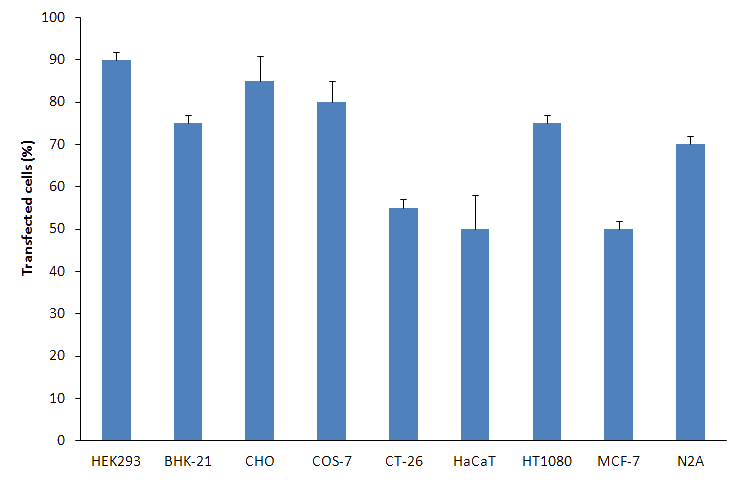
PolyMag Transfection Reagent is based on the Magnetofection™ transfection technology. This reagent has been optimized to be used with all types of nucleic acids. This reagent is composed of magnetic nanoparticles coated with cationic molecules. It has been successfully tested on a large range of primary cells, hard-to-transfect cells and cell lines and its efficiency has been reported in many publications.
- Highly efficient for primary cells
- Powerful for hard to transfect cells
- Non toxic
- Serum-compatible
- Simple, rapid and easy-to-use
- For all types of nucleic acids
Sizes:
- 100 µL (PN30100): 100 transfections with 1µg of DNA
- 200 µL (PN30200): 200 transfections with 1µg of DNA
- 1000 µL (PN31000): 1000 transfections with 1µg of DNA
- #KC30200: Starting Kit: Super Magnetic Plate + 100 µL of PolyMag, PolyMag Neo, CombiMag
Storage: + 4°C
Shipping conditions: Room temperature
- This reagent needs to be used with a magnetic plate
Application
- Suitable for all nucleic acids: DNA, oligonucleotides, mRNA, siRNA, shRNA...
- Mammalian cells: Cell lines, primary and hard to transfect cells.
- Perfect for all transfections applications in mammlian cells:
- transient or stable transfection
- gene silencing
- with or without serum
RECOMMENDED FOR: Transfection of primary and hard-to-transfect adherent cells
Results
 Figure 1: PolyMag transfection efficiency in various cell lines. Cells seeded in a 24-well plate were transfected with PolyMag and pGFP DNA at a 1μL of reagent per μg of DNA ratio. Transfection efficiency was monitored after 48h by flow cytometry.
Figure 1: PolyMag transfection efficiency in various cell lines. Cells seeded in a 24-well plate were transfected with PolyMag and pGFP DNA at a 1μL of reagent per μg of DNA ratio. Transfection efficiency was monitored after 48h by flow cytometry.






